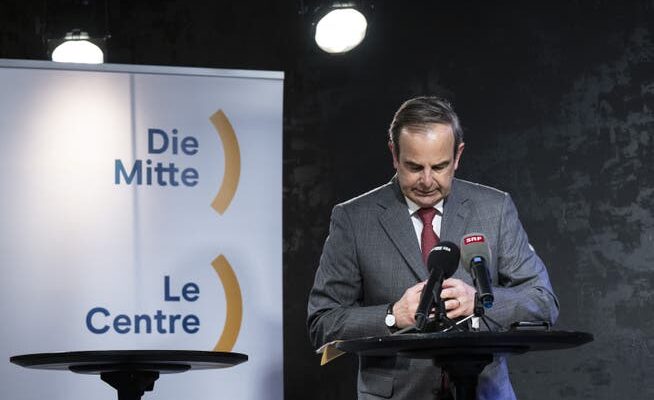The president remains dominant and competitive: the benchmark of 14 percent of the voters does not bother him.
Central President Gerhard Pfister invited to the traditional Epiphany Talk.
The invitation made it clear that many things should be different for the former CVP in the new year. 2023, it says, will be an election year “in which Die Mitte will appear as a new party for the first time”.
New year, new luck, but a new party?
At least she traditionally denied the start, on Friday at the annual Epiphany Talk in Bern. The president is still the same, as is his sense of mission.
Elections in Zurich as a yardstick
Gerhard Pfister can claim to have stopped the decades-long fall of the CVP for the time being and probably also stabilized the new centre. The “intensive reform process” of the party was not quite over after the name change. He has given himself until 2025 to do this. Pfister speaks of “good form” and still and often of “departure”. The devout Catholic and once conservative as the great reformer of his party? Even the three wise men would have rubbed their eyes.
In doing so, Pfister is not practicing astrology, but rather party-strategic Realpolitik. The only thing that counts in the upcoming fall elections are vote shares, seats. He is willing to have himself and the center measured against the expectations that are in the room after the merger with the BDP: If you cumulate the results from 2019, that would be almost 14 percent. But it won’t be that easy, it never was with Pfister and the middle.
If the then CVP had lost five seats in the last elections, Pfister would already be gone. According to his own statements, he had already written his resignation speech on election Sunday 2019. After the surprisingly smooth name change, he then dreamed of two Federal Council seats after the 2027 elections. He corrected this goal on Friday. Pfister has found his own center.
One is satisfied with one Federal Council seat – and with Viola Amherd, who occupies it. Her remaining in the defense department and her renunciation of the environment department are now demonstratively re-evaluated as a security policy commitment. A beacon of responsibility instead of desertion – politics is above all the struggle for the sovereignty of interpretation. And this is where Pfister’s strength lies.
According to a Sotomo poll last fall, 65 percent of centrists believe the president has had a positive effect on the party’s performance. This is the second best value, just behind FDP President Thierry Burkart. In recent months, the two have dominated the debate about how to deal appropriately with the Ukraine war. It’s about weapons and sanctions – and about profiling.
Three out of four Centrist voters in the same poll said their party’s political alignment is spot on. It becomes more difficult when it comes to the question of where to get new voters in the future. Above all, Pfister is hoping for new voters in the large Mittelland cantons. The Zurich cantonal elections in February will be an important indicator here: Can the “new party” exploit the new potential?
Finances are a matter for the Federal Council
Pfister is dominant, often falls into the house with the door. But in his slipstream he leaves room for discussions and for new minds. There is Marc Rüdisüli and the Junge Mitte, which has recently grown considerably and is taking a progressive course. The young people want progress on the EU dossier and are demanding that the Federal Council adopt a new negotiating mandate with the EU before the elections.
There is Christina Bachmann-Roth, President of the Mitte Frauen, who asks the health politician and Bernese Council of States candidate Lorenz Hess in a research-friendly manner why no woman follows the retiring National Councilor Ruth Humbel for a seat on the Health Commission. Or Karin Stadelmann, Lucerne cantonal councilor and member of the party executive committee, who once again regrets that the middle state councilors did not even step up to the premium relief initiative.
The new party still has the old polyphony, but today people are relaxed about it. Except when it comes to energy policy: the fact that some party representatives like Beat Rieder, member of the Central Council of States, have already described the energy strategy as a “blatant political mistake” is studiously ignored. The legacy of former Federal Councilor Doris Leuthard will not be shaken.
However, the party has nothing to say about the state treasury. Where exactly how many are to be saved in the future is a “classic management task” and a matter for the entire Federal Council, says party leader Pfister. He knows one thing for sure: the cutbacks will not get you any additional voter shares in the short term.
